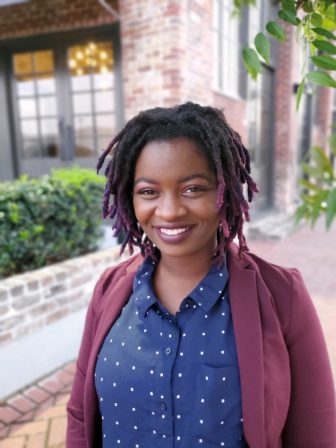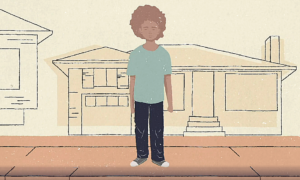
Joy Bruce/CASA New Orleans
Donica Carter
BATON ROUGE, Louisiana — On Thursday, Gov. John Bel Edwards signed Senate Bill 109 into law, making Louisiana the 29th state to extend foster-care services to all youth until age 21.
During the signing ceremony, the governor, like others in the room, expressed hope that because of the bill, the next generation of foster children would be more able to thrive.
Former foster child Donica Carter, 23, couldn’t attend the ceremony, because she was working her job at a New Orleans pizza place. But she felt a sense of celebration for her siblings who were still in foster care. “I feel good that my younger brothers and sisters — and other kids their age — will be able to grow up before they leave foster care…” Carter said.
Behind the bill’s almost-unanimous support — only one legislator cast a vote against it — was a group of passionate former foster children like Carter. Many had started visiting the Capitol through the Louisiana Institute for Children in Families, which runs a legislative internship program for former foster youth.
Carter was part of this year’s crop of interns. She wanted legislators to know that she had struggled badly five years ago, when she turned 18 and was no longer eligible for support from the state of Louisiana’s foster-care program.
But she found it difficult to testify about the struggles of her young life. “This might be the hardest thing I’ve ever done,” she told the Senate Select Committee on Women and Children, as she testified in support of Senate Bill 109.
At the age of 16, she told the legislators, she had asked a judge in New Orleans, her hometown, to place her in a foster home under the care of the Louisiana Department of Children and Family Services (DCFS).
“Being in foster care is hard. Coming from a troubled background is harder,” Carter told the committee. “But the hardest is the world dropping you when you’re 18. I wasn’t ready.”
Within three months, Carter was pregnant. Over the past several years, she and her daughter, Kanai, have lived in homeless shelters. Though she was a good student, her hopes of continuing her education were dashed.
A decade ago, in 2008, the U.S. Congress passed what’s known as the “Fostering Connections” act, which included a provision allowing states to be reimbursed for some costs if they extend foster care through age 21.
Since then, many states have moved to extend foster care, based on research showing that children who age-out at 18 are often unable to access healthcare, jobs and housing. Only a tiny proportion, roughly three percent, are able to earn a college diploma by age 25.
Five years ago, in compliance with what was then Louisiana law, Carter had “aged out” of the state’s foster-care system. For some children, aging out meant that a caseworker dropped them off at the home of a friend or a relative or at a youth facility like Covenant House. For Carter, it meant that her foster mom dropped her off at her 18-year-old boyfriend’s house.
“The thing is, his mom wouldn’t let me stay,” she said. “So I couch surfed. It was not my plan for myself. I had no money, no job, no family and seemingly no way forward.”
“The transition into adulthood isn’t easy for anybody, but just imagine what foster youth have had to endure by the time they reach 18,” state Sen. Regina Barrow, the bill’s author, said on Thursday. “They continue to need someone in their corner. And that’s what this is about.”
Last year, Barrow sponsored legislation that created a task force to study the issue, on the heels of Sen. Ryan Gatti’s SB 129 (Act 649), which extended care to 21 for anyone in high school or working toward a GED. The task force recommended expanding the program until age 21 to all youth who were in foster care when they reached 18 and who are enrolled in school, job-training or near-fulltime work. A program called Youth Villages awarded the state a $3 million grant to implement the Youth Villages YVLifeSet model, which uses highly trained case workers with small caseloads to provide high-intensity services that include at least one face-to-face session with youth per week.
Carter is sure that she would be in a different place in life if she had been given that extra attention from ages 18 to 21. Even now, five years later, Carter feels the need to catch up. Through concerted efforts made by CASA New Orleans and by DCFS caseworkers elsewhere in the state, many of her fellow interns were almost through college.
Carter had connected with CASA only a few years ago. The agency has helped her find her footing and she feels good about living on her own, paying her own rent and raising a wonderful child.
But she still wants to be part of that 3 percent who earn a college diploma. “My fellow interns are doing so much — they’re beating the odds. I don’t think I am. At least, not yet,” she said.




























